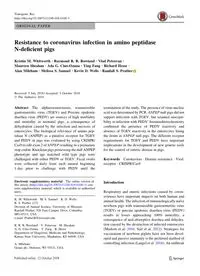
2018 Resistance to coronavirus infection in amino peptidase N-deficient pigs PDF
Preview 2018 Resistance to coronavirus infection in amino peptidase N-deficient pigs
ORIGINAL PAPER Resistance to coronavirus infection in amino peptidase N-deficient pigs Kristin M. Whitworth . Raymond R. R. Rowland . Vlad Petrovan . Maureen Sheahan . Ada G. Cino-Ozuna . Ying Fang . Richard Hesse . Alan Mileham . Melissa S. Samuel . Kevin D. Wells . Randall S. Prather Received: 5 July 2018 / Accepted: 5 October 2018 � The Author(s) 2018 Abstract The alphacoronaviruses, transmissible gastroenteritis virus (TGEV) and Porcine epidemic diarrhea virus (PEDV) are sources of high morbidity and mortality in neonatal pigs, a consequence of dehydration caused by the infection and necrosis of enterocytes. The biological relevance of amino pep- tidase N (ANPEP) as a putative receptor for TGEV and PEDV in pigs was evaluated by using CRISPR/ Cas9 to edit exon 2 of ANPEP resulting in a premature stop codon. Knockout pigs possessing the null ANPEP phenotype and age matched wild type pigs were challenged with either PEDV or TGEV. Fecal swabs were collected daily from each animal beginning 1 day prior to challenge with PEDV until the termination of the study. The presence of virus nucleic acid was determined by PCR. ANPEP null pigs did not support infection with TGEV, but retained suscepti- bility to infection with PEDV. Immunohistochemistry confirmed the presence of PEDV reactivity and absence of TGEV reactivity in the enterocytes lining the ileum in ANPEP null pigs. The different receptor requirements for TGEV and PEDV have important implications in the development of new genetic tools for the control of enteric disease in pigs. Keywords Coronavirus � Disease resistance � Viral receptor � CRISPR/Cas9 Introduction Respiratory and enteric infections caused by coron- aviruses have important impacts on both human and animal health. The infection of immunologically naı¨ve newborn pigs with transmissible gastroenteritis virus (TGEV) or porcine epidemic diarrhea virus (PEDV) results in losses approaching 100% mortality; a consequence of mal-absorptive diarrhea and dehydra- tion caused by the destruction of infected enterocytes (Madson et al. 2016; Saif et al. 2012). Strategies for vaccination of newborn piglets have not been devel- oped and passive immunity is the preferred method of controlling infection (Langel et al. 2016). An outbreak Electronic supplementary material The online version of this article (https://doi.org/10.1007/s11248-018-0100-3) con- tains supplementary material, which is available to authorized users. K. M. Whitworth � M. S. Samuel � K. D. Wells � R. S. Prather (&) Division of Animal Science, University of Missouri, Randall Prather, 920 East Campus Drive, Columbia, MO 65211, USA e-mail:
